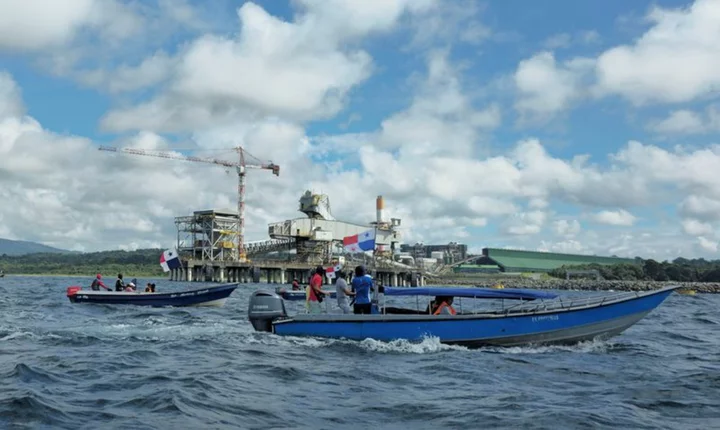By Valentine Hilaire and Divya Rajagopal
PANAMA CITY/TORONTO For more than a month, a group of 16 fishing boats has been blocking a key port in Panama, choking off coal and essential supplies destined for First Quantum Minerals' giant copper mine there, eventually forcing it to halt operations at the company's biggest revenue source.
The fishing flotilla has provided a fresh jolt of marine backing to the thousands of Panamanians who have been marching daily to demand the annulment of the Canadian miner's contract, arguing its presence violates Panama's sovereignty and threatens its environment.
The fishermen are angry that the company has appropriated resources, land and water, and worry about the mine's environmental consequences. Cobre Panama has said it is committed to growing more new forest than is impacted by its mine.
Panama's top court on Tuesday declared First Quantum's contract unconstitutional and its president announced an orderly shutdown of the mine, but the vigils on land and sea are set to continue as protesters insist that authorities take concrete steps to close the site.
"We aren't going anywhere," Sabino Ayarza, a representative of the protesting fishermen, told Reuters on Tuesday from his boat.
A complete shuttering of the mine, which accounts for about 1% of global copper output and 5% of Panama's GDP, would signal a David vs. Goliath victory for Panamanian protesters.
Their grassroots movement, nearly unheard of in business-friendly Panama, has wiped C$11 billion ($7.4 billion) off First Quantum's market value and raised global copper prices on supply worries. Copper is a crucial metal in electrification as the world moves to reduce reliance on fossil fuels.
The protesters' victory in Panama is emblematic of the outsized and sometimes unexpected influence local communities are having on mining companies worldwide. In Portugal, for instance, Europe's biggest producer of lithium, some local activists are determined to halt mine developments. Canada's First Nation groups have also mounted fierce opposition against mining on their lands.
Those hoping to halt the mine's operations have seen false dawns before. Panama's top court struck down First Quantum's previous contract in 2017, but the company was allowed to mine while a new contract was approved. So protesters aren't taking any chances this time.
"If this goes on for a year, we will stay a year, there is no end-date," Ayarza said.
Cobre Panama accounted for about 46% of First Quantum's overall revenue in the third quarter, according to company data. The company was "reasonably confident" last week in ships carrying supplies reaching the port soon, but failed to circumvent the fishermen's blockade, said a person familiar with the mine's developments who asked not to be named.
First Quantum, said it would respect the court's ruling and on Tuesday announced the mine has suspended commercial production due to the blockades.
SURPLUS THREATENED
A Scotiabank report forecasts Cobre Panama's copper output in 2024 to represent about 1.6% of global supply and warned an indefinite shutdown increases risks of First Quantum potentially defaulting by the third quarter of 2024, and threaten its liquidity by early 2025.
First Quantum did not immediately reply to a request for comment on the question about possible default.
Together with dwindling supply from Peru, the world's No. 2 copper producer after Chile, the Panama shutdown threatens to wipe out what had been seen as global surplus in 2024, according to Macquarie.
In Chile, the copper outlook for 2023 went from 5.9% growth in May to 1% in July, as state-owned miner Codelco, the world's largest producer, lowered production amid operational difficulties, though it is expected to recover in 2024.
The fishermen have added muscle to a movement which blocked roads, causing daily losses of more than $90 million to businesses, according to experts, and food shortages nationwide. Protesters also hurled rocks at a bus transporting workers to the mine on one occasion, injuring eight workers.
The court verdict leaves three possible outcomes: Panama could close the mine indefinitely, nationalize it, or agree to settle its differences in international arbitration by negotiating a constitutionally correct contract with First Quantum alongside a new joint-venture partner.
"We believe it may be time for FM to consider bringing in a major mining partner to share the future risk of operating in Panama," Scotiabank said in a note on Tuesday.
However, protesters are pushing firmly towards a ban on all kinds of mining despite warnings of economic consequences.
The protesting fishermen have been posting their bank account details on social media for people to donate food and fuel. Ayarza did not detail how much they have received, but said he was confident they can outlast the mining giant.
"We know our sea. We know the area in which we are waging war," said Ayarza. "We use ropes to make them back down and, well, threaten them so they have to go back."
($1 = 1.3579 Canadian dollars)
(Reporting by Valentine Hilaire in Mexico City and Divya Rajagopal in Toronto; Additional reporting by Fabian Cambero in Santiago; Editing by Christian Plumb, Denny Thomas and Nick Zieminski)

